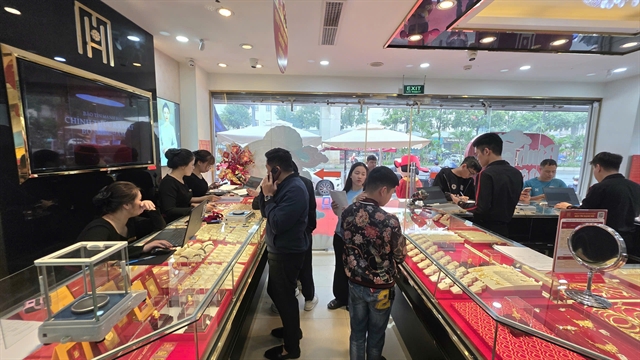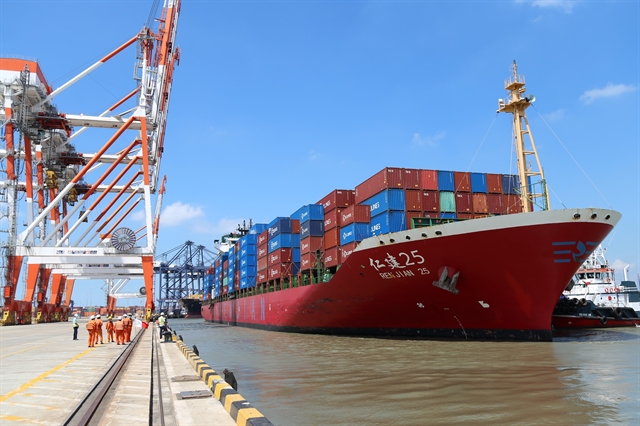 Economy
Economy


|
| Containers are loaded on a vessel in Tân Cảng - Cái Mép Thị Vải port in Bà Rịa - Vũng Tàu Province. VNA/VNS Photo Huỳnh Ngọc Sơn |
HÀ NỘI — Việt Nam has many opportunities to enhance exports to the European and American markets but logistic issues are causing bottlenecks to this potential.
Deputy Minister Ministry of Industry and Trade Đỗ Thắng Hải addressed a conference yesterday, entitled "Development of Việt Nam's logistics industry with Europe - America region".
He said that the local logistics industry has had strong development in recent years but still faced many challenges such as service costs, bottlenecks in infrastructure, warehousing, equipment and human resources
Hải said that the World Bank's most recent logistics performance index ranked Việt Nam 39th out of 160 countries and third in Southeast Asia. This is Việt Nam's highest position to date.
He added: “Logistics is also one of the fastest-growing and most stable industries of Việt Nam with an average growth rate of 14-16 per cent per year, contributing to GDP from 4-5 per cent.”
He calculated the whole country has about 30,000 enterprises operating in the field of logistics, with about 5,000 professional enterprises so far.
However, while Europe and America are major trade partners of Việt Nam, congestion on container transport routes, especially in transport routes, as well as a large shortage of empty containers continuing from 2020, has seriously affected the export of goods to these markets.
Roger Wu, Business Development Manager of the Port of Long Beach, California (USA) said that the pandemic created an unprecedented situation, adding the current bottlenecks were mostly in the United States.
According to the analysis from 2021, congestion in ports will increase by 6 per cent while cargo shipments have been shifted to ports from air services under the Government's blockade measures in the past.
Bùi Huy Sơn, Vietnamese Trade Counselor in the US, said that the congestion of sea routes had influenced a shift to road and air, while the increase in e-commerce activities for smaller orders has greatly affected normal export activities.
Sơn said: “Congestion in the US has a direct impact on costs and makes businesses passive when accessing the market, especially seasonal products such as apparel, footwear, agricultural products, electronics, and consumer goods.”
He added in the first ten months of 2021, the total export turnover of these commodities to the US reached US$24.8 billion, accounting for 32.8 per cent of the total export turnover of Việt Nam to the US.
If these businesses continue to face difficulties in logistics in the long run, they will lose their direct link with the transport chain and have to depend on other businesses.
Seafood was one of Việt Nam's main exports to Europe and America, said Nguyễn Hoài Nam, Deputy General Secretary of the Vietnam Association of Seafood Exporters and Producers (VASEP). Nam expressed concerns about the increased logistics costs and freight rates, causing difficulties for seafood exporters.
Nam said though it was the peak time of the year for the export of seafood, the enterprises faced an increase in all parts of the chain such as fees, shipping time, booking for containers, number of delay days at the port and fees for docking there.
Nam said before November 2020, the highest cost to transport to Europe and the US was $3,000 per container. Now it is $17,000 for the East Coast, $13,000-14,000 for the West Coast and $12,000-14,000 for European ports.
It was less than $1,500 per container to the Middle East; now it is $10,000 -$11,000, said Nam.
Hans Kerstens, Deputy Head of Transport and Logistics Sub-Committee of Eurocham, said the logistics companies were trying to find solutions to avoid congestion such as having their own ships and empty containers.
“Transporting goods from Việt Nam to Europe also needs to be adjusted, not only depending on sea transport but also diversifying modes of transport, to ensure that the goods arrive at the right place and at the right time,” Hans Kerstens shared.
Around 90 per cent of exports from Việt Nam depend on foreign shipping companies. A participant of the conference suggested that Việt Nam should develop its own logistic routes, adding that a local company like Hòa Phát could produce the empty containers.
As a response, Lê Quang Trung, deputy general director of the Việt Nam Maritime Corporation (VIMC) said VIMC had deployed such a team for a shorter route from Việt Nam to India.
In the future, Trung said VIMC would develop more international routes to serve demand.
At the conference, participants also mentioned the rapid development of e-commerce, and more consumers' habits of e-buying had developed an e-logistics system so that Vietnamese enterprises could promptly seize opportunities for export development through cross-border e-commerce.
According to the conference, the Asia-Pacific region currently dominated the global logistics market with a significant market share thanks to the increased import and export activities, and growing demand from urbanisation.
With signed free trade agreements and policies and the trend that American and European companies are shifting to Việt Nam, the local logistic industry is of great potential to become “the world's cargo transhipment centre, not only the seaport but for all kinds of logistics.”-VNS